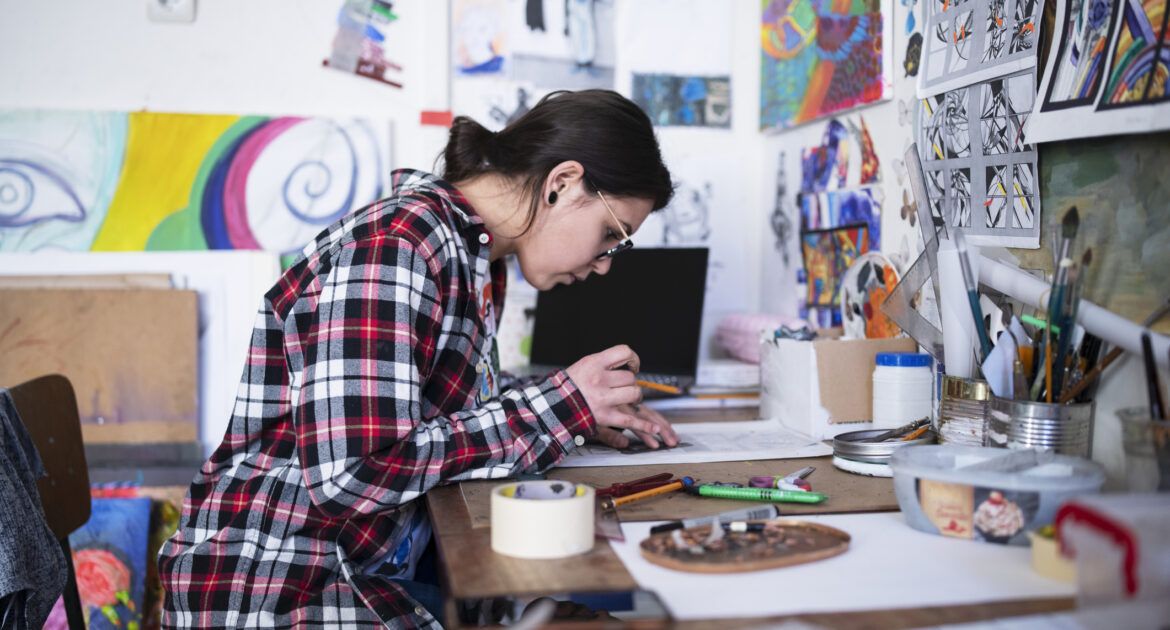We are ALL born creative, yet as we progress through life our creativity seems to diminish. So, what happens to most of us when we reach adulthood? Why do we find it necessary to fit in to an organised set of values and beliefs? Why do we dwell on what other people think? Why are we reserved and timid when it comes to showing off our new ideas? Why does failure scare us? Why do we find it so difficult to ask for help?
I blame the lack of creativity in most education systems. The regimented, disciplined and mostly didactic method of educating often destroys an individual’s creativity. As adults, we remain the child with the volcanic desire to share our imagination with the world, but this is not always welcomed. Many of us worry about other people’s opinions. Many of us are afraid of negativity and failure and therefore stay on the safe and steady path.
For those adults who embrace risk-taking, they continue to nurture their creative mind. They realise its value and potential. For them, imaginative idea generation is their power and best attribute. This, combined with an unequivocal belief in their creative potential, has the formula to establish great things.
‘Creative people are curious, flexible, persistent, and independent with a tremendous spirit of adventure and a love of play.’ ~ Henri Matisse
Adults, even if unknowingly, can easily crush creativity. As we reach our teenage years, most of us recall a teacher or lecturer instructing us to be quiet, to stop messing about, to adhere by rules, to sit still in a seat for hours, to carry out tasks, and to learn off by heart, tables, formulae, phrases, and vocabulary. The fact that we have no real understanding of what we are learning does not seem to matter. Didactic instruction ruled our education systems and still does for many. There is little room for creative experimentation and collaborative sharing of ideas on a regular and consistent basis. There is limited emphasis on creativity and the necessity for fuelling and celebrating the creative mind.
I believe it is vital that the adult recognises that each student has a creative mind. This should be celebrated, nurtured and stimulated. In order to do that, the adult needs to reignite their own creative mind. Sound can have such a profound effect on our creative thinking that we need to actively listen. We live in such a noisy world where it is difficult to find quiet. Quiet though is a necessary part of the creative journey.
The sheer level of noise all around us causes everyone to turn down their level of hearing, simply as a defence mechanism. To encourage students to listen effectively, even when no one is talking, take some time to tune into the sounds that reach your own ears. Do you hear cars passing on the nearby road? Do you hear dogs barking or the birdsong amidst the trees? Can you hear children’s laughter as they are walking home from school? Can you hear your own breathing?
Once you have sensitized you own ears, you can begin to help your students realise the importance and value of listening. Better listening leads to better understanding. Better listening can find solutions. Better listening can discover talents and creative capabilities. Better listening can offer new opportunities to be fully in tune with ourselves, and with others.
Four Points to Remember:
- Creativity can be unlocked and nurtured by creating the right conditions for growth.
- Ideas need time to marinate. Students need time to soak in a problem and let the ideas flow freely and gradually.
- Creativity is more likely to be present when a student feels positive emotions such as happiness than when a student experiences negative emotions such as anxiety and fear.
- While intelligence has to do more with processing speed, planning and memory, creativity is characterized by novelty and originality.
Top Three Tips to Unlocking Students’ Creativity:
- It must be safe and stimulating for all students to offer ideas.
- Do not allow emotions to become attached to your creative ideas.
- Embrace your own vulnerability and students’ vulnerability- as most of the time our creative potential is stunted by fear of failure.





Leave a Reply